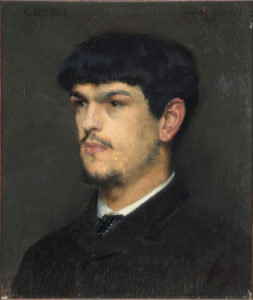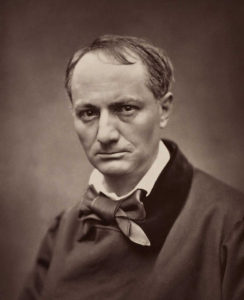Here are my translations of three poems by the French poet Charles Baudelaire (1821-1867) from Les fleurs du mal:
- Harmonie du soir – Harmony of the Evening,
- Le Chat – The Cat (n. XXXIV),
- Chant d’automne – The Song of Autunm.
In translating Baudelaire, the first question is how to translate the title of his collection of poems Les fleurs du mal. It is often translated in English as “Flowers of Evil” but I find that I need more words to get the idea across in English: I could add Flowers of badness, darkness, despair, discomfort or loathing. It depends on what you mean by “Evil” and there are more shades of meaning in “Mal” than in Evil.
The same is true of the Italian cognate term “il male.” In Italian, this title is “I fiori del male” where “male” is a close fit for the French “mal.” It is a shorter and easier step to translate “mal” into Italian as “male” rather than to make that meaning fit into the differently-shaped box of the English word “Evil.”
Harmony of the Evening
This is one of five poems of Baudelaire that Claude Debussy set to music early in his career, 1887-1889, which is five years before he became famous for the Prélude à l’après-midi d’une faune and other works.
Line three of this poem, “Les sons et les parfums tournent dans l’air du soir” (Sounds and odors swirl round in the evening air) is the title of one of Debussy’s Préludes for piano, number four in book one. Here it is, played by the great pianist Leonard Pennario:
Harmony of the Evening is written in a form called Pantoum (Pantoun in French) in which lines 1 and 3, in a stanza after the first one, copy lines 2 and 4 from the stanza above. Victor Hugo discovered the form in Malay poetry and brought it into French. I have kept each line of the original on one line in the translation, to preserve the Pantoum form.
(Translation (c) 2016 Chris DiMatteo. All rights reserved)

The young Claude Debussy, in a portrait from 1884, He used line 3 of “Harmonie du soir” as the title of the fourth of his Préludes for Piano, Book I.
Now comes the time when on top of the stems,
Each flower trembles and perfumes like incense
Sounds and odors swirl round in the evening air;
A sad gloomy waltz and a languorous dizziness!
Each flower trembles and perfumes like incense
Like a tormented heart the violin vibrates,
A sad gloomy waltz and a languorous dizziness!
The heavens sad beauty, so much like a morgue.
Like a tormented heart the violin vibrates,
A sweetheart that dislikes the vast and dark nothingness
The heavens sad beauty, so much like a morgue.
The sun has drowned in its own drying blood.
A sweetheart that dislikes the vast and dark nothingness
Collecting the memory of its luminous past
The sun has drowned in its own drying blood.
Your memory glows like a view of the sacrament.
Harmonie du soir
(original text, for reference)
Voici venir les temps où vibrant sur sa tige
Chaque fleur s’évapore ainsi qu’un encensoir;
Les sons et les parfums tournent dans l’air du soir;
Valse mélancolique et langoureux vertige!
Chaque fleur s’évapore ainsi qu’un encensoir;
Le violon frémit comme un coeur qu’on afflige;
Valse mélancolique et langoureux vertige!
Le ciel est triste et beau comme un grand reposoir.
Le violon frémit comme un coeur qu’on afflige,
Un coeur tendre, qui hait le néant vaste et noir!
Le ciel est triste et beau comme un grand reposoir;
Le soleil s’est noyé dans son sang qui se fige.
Un coeur tendre, qui hait le néant vaste et noir,
Du passé lumineux recueille tout vestige!
Le soleil s’est noyé dans son sang qui se fige…
Ton souvenir en moi luit comme un ostensoir!
My translation of THE CAT (n. XXXIV) by Charles Baudelaire
(Translation (c) 2016 Chris DiMatteo. All rights reserved)
Lie here, pretty cat, over my loving heart;
Pull in the sharp claws from your paws,
And let me plunge into your beautiful eyes,
Their mixtures of metal and agate.
Then with my fingers caressing you softly
On your head and on your supple back,
And with my hand feeling drunk with the pleasure,
Of touching your body electric,
I see my lady in spirit. Her gaze,
Like yours, my sweet little beast,
Deep and cold, slices and cuts like a lance,
And, from your feet all the way to your head,
A subtle air, perfume of danger
Swirls all around your dark body.
XXXIV LE CHAT (the original, for reference)
Viens, mon beau chat, sur mon coeur amoureux;
Retiens les griffes de ta patte,
Et laisse-moi plonger dans tes beaux yeux,
Mêlés de metal et d’agate.
Lorsque mes doigts caressent à loisir
a tête et ton dos élastique,
Et que ma main s’enivre du plaisir
De palper ton corps électrique,
Je vois ma femme en esprit. Son regard,
Comme le tien, aimable bête
Profond et froid, coupe et fend comme un dard,
Et, des pieds jusques à la tête,
Un air subtil, un dangereux parfum
Nagent autour de son corps brun.
Here is the poem read in French, nicely, by Michael Mansour, from his fine website “La minute de poesie.”
Song of Autumn
(Translation (c) 2016 Chris DiMatteo. All rights reserved)
I
Soon we will plunge into dark and cold shadows;
Goodbye, vivid light of our far too short Summer!
I hear the dull fall with funereal thud
Of the branches on paving stones there in the streets.
The whole Winter season will steep in my being,
Its rage, loathing, shivering horror and labor,
And just as the sun in its polar inferno,
My heart will then freeze into solid red ice.
I hear with a shiver as each branch falls down;
The gallows they build in an echo of deafness,
My mind is the same as a tower that falls,
Over thundering strikes of a battering ram.
It is rocked by the steady monotonous blows,
As if hastily banging the nails in a coffin,
For whom? Was it not just yesterday, Summer?
This mysterious noise marks a sudden departure.
II
Autumn, I so love your bright deep green eyes,
Sweet beautiful gaze, yet today turning bitter,
And neither your love, nor your bed, nor your fire,
Compares to the sight of the sun on the sea.
And so will you love me, with such tender heart,
As a mother loves even an ungrateful wretch?
Please be the sweetness of lover or sister,
The glorious autumn, the swift setting sun.
The tomb awaits open, and makes its short work!
Here may I lie with my head on your knees,
And taste with regret the still torrid clear bright
Of the Summer that fades into sweet yellow light.
Chant d’automne
(the original, for reference)
I
Bientôt nous plongerons dans les froides ténèbres;
Adieu, vive clarté de nos étés trop courts!
J’entends déjà tomber avec des chocs funèbres
Le bois retentissant sur le pavé des cours.
Tout l’hiver va rentrer dans mon être: colère,
Haine, frissons, horreur, labeur dur et forcé,
Et, comme le soleil dans son enfer polaire,
Mon coeur ne sera plus qu’un bloc rouge et glacé.
J’écoute en frémissant chaque bûche qui tombe;
L’échafaud qu’on bâtit n’a pas d’écho plus sourd.
Mon esprit est pareil à la tour qui succombe
Sous les coups du bélier infatigable et lourd.
Il me semble, bercé par ce choc monotone,
Qu’on cloue en grande hâte un cercueil quelque part.
Pour qui? – c’était hier l’été; voici l’automne!
Ce bruit mystérieux sonne comme un départ.
II
J’aime de vos longs yeux la lumière verdâtre,
Douce beauté, mais tout aujourd`hui m’est amer,
Et rien, ni votre amour, ni le boudoir, ni l’âtre,
Ne me vaut le soleil rayonnant sur la mer.
Et pourtant aimez-moi, tendre coeur! soyez mère
Même pour un ingrat, même pour un méchant;
Amante ou soeur, soyez la douceur éphémère
D’un glorieux automne ou d’un soleil couchant.
Courte tâche! la tombe attend; elle est avide!
Ah! laissez-moi, mon front posé sur vos genoux,
Goûter, en regrettant l’été blanc et torride,
De l’arrière-saison le rayon jaune et doux!
(The original poems are in the public domain. My translations are (c) 2016 Christopher DiMatteo. All rights reserved. I present the musical illustration of the recording of the Debussy Prélude under fair use for non-profit study purposes.)

